by M. C. Jennings | Oct 31, 2024 | Academics, Careers In..., COBA Faculty, COBA Staff, College Decisions, Current Students, Faith Infusion, Marketing, Outcomes, Professional Development, Student Spotlights, Student Spotlights
 Senior marketing major Carol Queiroz from Brazil recently completed a rewarding internship at Imaginuity, a marketing agency based in Dallas. Her experiences during this internship have not only enhanced her skill set but also prepared her for future career opportunities.
Senior marketing major Carol Queiroz from Brazil recently completed a rewarding internship at Imaginuity, a marketing agency based in Dallas. Her experiences during this internship have not only enhanced her skill set but also prepared her for future career opportunities.
Carol’s internship at Imaginuity was part of a rotational program, allowing her to gain hands-on experience in various departments. Throughout her time there, she explored areas such as social media, user experience, website creation, and client partnership. This exposure to diverse aspects of marketing provided her with a well-rounded understanding of the industry.
One of Carol’s favorite aspects of the internship was building website pages. This opportunity allowed her to combine her creative skills in content creation with the technical skills required for website development. She relished the chance to see her ideas come to life in a digital format, reinforcing her passion for marketing.
Carol said that learning to be adaptable was one of the greatest lessons she gained from her internship. She learned that even in areas where she initially had little interest, there were valuable insights and skills to be gained. This lesson in flexibility is one she believes will serve her well in her future career.
Interning at Imaginuity has opened numerous doors for Carol. The diverse experiences she gained will enable her to apply for various job opportunities after graduation, equipped with a unique skill set that few candidates possess. While she has been encouraged to apply for a full-time position at Imaginuity, Carol has also been accepted into a master’s program in communication at ACU, which she is excited to pursue.
For students seeking internships, Carol offers some sage advice: “Go to the career fair! I got my job there. Also, talk to Jasmine as much as possible. She is a good resource to help with your resume and job search.” She also recommends building a network on campus and maintaining relationships with professors which can open unexpected opportunities in the future.
 Carol credits her time at ACU as essential preparation for her internship and future endeavors. The Professional Development team, in particular, has been instrumental in her journey, providing support and resources throughout her college years.
Carol credits her time at ACU as essential preparation for her internship and future endeavors. The Professional Development team, in particular, has been instrumental in her journey, providing support and resources throughout her college years.
Being a business major at ACU has not only equipped Carol with technical knowledge but also essential life skills. She values the lessons in negotiation, networking, and entrepreneurship that she has gained, stating, “This knowledge is something that no one can take away from me and something that I will carry with me for life. I am very grateful to have received all of this at COBA.”
As graduation approaches, Carol reflects on her three years at ACU with gratitude. Her advice to current students is to savor every moment of their journey. “The whole process you’re going through on campus is preparing you for life off campus,” she emphasizes.
With her newfound skills and experiences, Carol is well-prepared to take on the next chapter of her life, whether in a full-time role or as a graduate student. Imaginuity has played a pivotal role in shaping her future, and she looks forward to what lies ahead.
by M. C. Jennings | Oct 3, 2024 | Accounting, College Decisions, Current Students, Faculty Testimonials, Faith Infusion, MAcc, Outcomes, Placement stories, Student Spotlights, Student Spotlights, Uncategorized
Senior accounting major Katelynn Oksanen spent her summer break interning at EY’s Dallas office, where she gained invaluable insights into the world of auditing. Katelynn’s experience not only deepened her understanding of the audit process but also equipped her with skills that will serve her well in her future career.
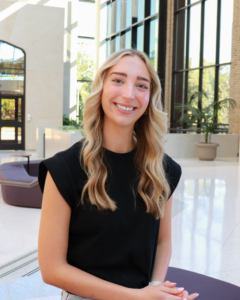 At the outset of her internship, Katelynn participated in a comprehensive training program alongside other audit interns from the region. This training provided her with foundational knowledge and set the stage for her subsequent hands-on experience. One highlight of her internship was the Intern Innovation Experience, where she explored data visualization and analysis tools crucial to the accounting profession. This exposure to cutting-edge technologies broadened her perspective on the role of data in auditing.
At the outset of her internship, Katelynn participated in a comprehensive training program alongside other audit interns from the region. This training provided her with foundational knowledge and set the stage for her subsequent hands-on experience. One highlight of her internship was the Intern Innovation Experience, where she explored data visualization and analysis tools crucial to the accounting profession. This exposure to cutting-edge technologies broadened her perspective on the role of data in auditing.
Throughout her time at EY, Katelynn collaborated with various teams, assisting with multiple components of the audit process. This collaboration not only enhanced her technical skills but also allowed her to develop a deeper appreciation for teamwork. “I enjoyed working with the teams I was assigned to and getting to know the employees and other interns at the firm,” Katelynn reflected. “The hands-on experience I gained is something that’s hard to replicate in the classroom.”
Katelynn’s internship also reinforced her ability to communicate effectively within a team, a skill that is essential in any professional setting. She noted that this experience provided her with a clearer understanding of what auditing looks like in a large-scale business environment, bridging the gap between theoretical knowledge and real-world application.
Looking ahead, Katelynn is excited to share that her internship is leading to full-time employment with EY. This opportunity reflects her hard work and the connections she made during her internship.
For students seeking internships, Katelynn offers invaluable advice: “Put yourself out there! There are many companies eager to hire you and get to know you. In addition, don’t be afraid to reach out to ACU alumni. ACU has a strong alumni network that wants to help ACU students find jobs and internships.”
Katelynn credits her time at ACU for preparing her for this pivotal internship. “Many of my courses and professors provided real-life scenarios and deeper knowledge that prepared me for the tasks involved in my internship. Additionally, many resources on campus helped me prepare the documents needed to secure a job, such as resume-building services through COBA’s professional development staff. One of the most rewarding aspects of being a business student at ACU has been the exceptional support from our professors. They genuinely care about their students and make an effort to get to know who is in their classroom. It’s evident that they want to see their students succeed!”
 As Katelynn embarks on her professional journey, her experiences at EY and the foundation laid at ACU will undoubtedly propel her toward success in the accounting field. Her story is an inspiring reminder of the impact of internships and the importance of seizing opportunities in one’s academic and professional journey.
As Katelynn embarks on her professional journey, her experiences at EY and the foundation laid at ACU will undoubtedly propel her toward success in the accounting field. Her story is an inspiring reminder of the impact of internships and the importance of seizing opportunities in one’s academic and professional journey.
To learn more about the College of Business at ACU, click here.
To learn more about ACU’s Career fair, click here.
by M. C. Jennings | May 9, 2024 | Academics, Alumni Spotlight, COBA Faculty, Dean Chronicles, Faith Infusion, Uncategorized
written by special contributor Lance Fleming
“May the peace of the Lord Christ go with you,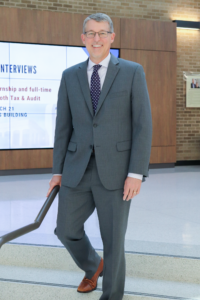
Wherever He may send you.
May He guide you through the wilderness,
Protect you through the storm.
May He bring you home rejoicing
At the wonders He has shown you.
May He bring you home rejoicing
Once again into our doors.”
Each year since becoming Dean of the College of Business Administration in May 2016, Dr. Brad Crisp (’93) has sent December and May graduating seniors into the world with the words of that favorite Celtic blessing spoken over them.
“The prayer points to the blessings of God’s presence in all circumstances,” Crisp said, “as well as the hope that our students will remain connected with us, telling the stories of what God has done in their lives.”
That excerpt from the prayer also offers peace and a reminder that home – and the relationships that go with being home – are always available to everyone. It’s appropriate that Crisp would choose a lyric about coming home as the blessing he would speak over students. If Crisp’s eight-year tenure as the Dean of COBA is marked by one thing, it would be how much he values relationships.
Relationships with students. Relationships with colleagues. Relationships with graduates, donors, and friends of the university. Relationships with family. It’s who he is, and it’s been his lighthouse during his eight-year tenure as Dean.
friends of the university. Relationships with family. It’s who he is, and it’s been his lighthouse during his eight-year tenure as Dean.
“Brad has kept us focused on relationships,” said Tim Johnston (’80), Assistant Dean of COBA. “We want to engage our students while they complete their studies, but we need to help each other for a lifetime. I like the blessing he always shared with our graduating students because it demonstrates his kind pursuit of relationships.”
Crisp delivered the blessing over graduating seniors one final time as Dean in early May before beginning a year-long sabbatical. ACU will name a new Dean of COBA sometime this summer before Crisp returns in 2025-26 as a full-time faculty member.
The fifth Dean of COBA since it became a college in 1981, Crisp leaves the post with a long list of accomplishments, but just as long a list of people influenced and relationships created. Those are part of what has made his tenure as Dean a success.
“Brad carries himself with dignity, honor, and a spirit of Christ-like humility,” said Andy Little (’97), Associate Dean of COBA and Associate Professor of Business Law. “He constantly reminds me to elevate my perspective, see the good in others, and treat people as worthy of our highest respect. I’ve been blessed to have a handful of good professional mentors, but none have had Brad’s exceedingly rare combination of kindness, wisdom, intellect, patience, and faith. We will miss his influence on the college dearly, but he deserves a sabbatical and time to reflect and recharge. I look forward to being his colleague and friend on the faculty for many more years.”
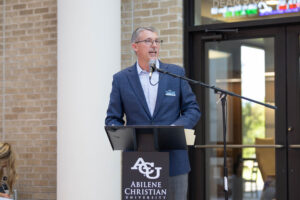 The list of accomplishments during his tenure is long and has COBA positioned to continue its rise when the new Dean steps in later this year. During his eight years, Crisp has hired more than one dozen new faculty members plus key administrative staff, overseen a complete renovation of the Mabee Business Building, moved COBA into the world of online education, successfully integrated technology into the core curriculum, and led the charge to require internships. He has overseen successful accreditation processes for the Accreditation Board for Engineering and Technology (ABET) and the Association to Advance Collegiate Schools of Business (AACSB).
The list of accomplishments during his tenure is long and has COBA positioned to continue its rise when the new Dean steps in later this year. During his eight years, Crisp has hired more than one dozen new faculty members plus key administrative staff, overseen a complete renovation of the Mabee Business Building, moved COBA into the world of online education, successfully integrated technology into the core curriculum, and led the charge to require internships. He has overseen successful accreditation processes for the Accreditation Board for Engineering and Technology (ABET) and the Association to Advance Collegiate Schools of Business (AACSB).
Many of these accomplishments resulted from the college’s completed 2022 Strategic Plan, which built on the strengths he inherited and positioned COBA to reach new heights through the college’s new 2026 Strategic Plan. The college’s endowments grew by more than $50 million during Crisp’s tenure, advanced significantly by a $29 million gift to COBA from the Dukes family in 2022. Crisp also directed new scholarship funds to attract and retain residential business students.
He’s done that without letting go of his belief in the vision set out for COBA: to connect, inspire, and equip Christian business and technology professionals, who honor God and bless the world.
“Brad is steady, and he quietly makes progress on the plans we have set out,” Johnston said. “He has stayed focused on the goals at hand and helped us take the right next step. That helped us keep moving, and we steadily made progress. Brad is a scholar dedicated to teaching and scholarly work. He poured into actively engaging with AACSB, serving on many site-visit reviews. He garnered insights that guided us through successful AACSB re-accreditation processes. He took to heart the desire to advance our college with continuous improvements.
“Brad has navigated the difficulties of attracting talented scholars to ACU and our mission,” Johnston said. “He did that at a time when online education has been a driving force for all business schools across the country. All new hires would have to be capable of teaching our residential and online students. The drive to help all faculty build the skillset to teach with multiple modalities is a critical accomplishment. A snapshot of the faculty in each program – many of whom Brad hired – will show everyone an impressive lineup of credentials and people of character who are moving the mission and our vision forward.”
Crisp recognizes that much of his success stems from his deep history with ACU, having been immersed in the ACU culture since he was young. His father, Don Crisp (’64) was Chairman of the Board of Trustees, and his father-in-law is former ACU president and current chancellor, Dr. Royce Money (’64).
And he’s following in the footsteps of men like, among others, Dr. Bill Petty (’64), Dr. Jack Griggs (’64), and Dr. Rick Lytle, who taught and mentored thousands of students over the years, including Crisp.
“Being the dean of this college is about legacy and relationships because you’re following in the footsteps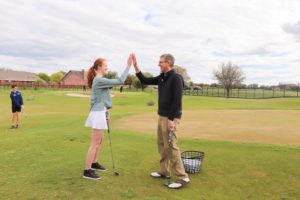 of people who’ve done this and shown the way and built a foundation for what you’re doing,” Crisp said. “I’m fortunate to have important, ongoing relationships with those men. I also have relationships with so many peers, donors, and other people who love this place and want to figure out how to help the current students in what they want to accomplish.”
of people who’ve done this and shown the way and built a foundation for what you’re doing,” Crisp said. “I’m fortunate to have important, ongoing relationships with those men. I also have relationships with so many peers, donors, and other people who love this place and want to figure out how to help the current students in what they want to accomplish.”
Crisp will leave the job having positioned the next dean for success but knowing that a new set of challenges awaits whoever is next to lead COBA.
“Our students are coming from different perspectives within and outside the Christian world,” Crisp said. “We can’t make the same assumptions about who they are and what they know. We must create opportunities for them to engage their faith as they acquire the skills needed to become the professionals we want them to be. And at the end of the day, they’re going to be the ones that decide who they want to be and how they live.
“But we’ve got a tremendous opportunity to put them in connection with other people who are going to give them a vision for what their life could look like as a Christian business or technology professional,” he said. “I don’t think we’ve finished that process at all. We are wrestling with how we do that. I hope the next team will help us push that forward in some important ways, just as we started online conversations before I became dean. And we settled some of those things. So, can we build on that? Can we put new processes and structures in place and maintain that as a primary focus of who we are and what we do?”
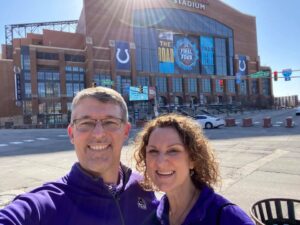 Crisp said he plans to use his sabbatical to recharge his batteries, re-tool for research and teaching, travel with his wife Jennifer (’93), visit family, and await the arrival of a second grandchild. He’ll return to the classroom at ACU in the fall of 2025, where he will again engage with students daily, helping lead them in the direction that best fits their skills.
Crisp said he plans to use his sabbatical to recharge his batteries, re-tool for research and teaching, travel with his wife Jennifer (’93), visit family, and await the arrival of a second grandchild. He’ll return to the classroom at ACU in the fall of 2025, where he will again engage with students daily, helping lead them in the direction that best fits their skills.
“I’ve always enjoyed the engagement with students,” Crisp said. “I’ve got 15 students in the one class I’m teaching right now, and the first assignment was a cover letter and resume, so I’m helping them think from day one about who they are and how they want to present themselves professionally.”
The relationships with students and faculty as colleagues excite Crisp about the next season of his life.
“I will miss the opportunity to engage with as broad a group as I have had the last eight years,” Crisp said. “The relationship is different when you manage people instead of working alongside them as colleagues. I have certainly had to have some hard personnel conversations, but these can be holy times, too. I’ve also had the chance to walk with people through hard times, helping them work through issues, and those moments are special. Some of my free time will allow me to create opportunities that keep me engaged with people inside and outside ACU. I don’t know exactly where my focus will be, but I know I’ll want to do more than be in the office 9 to 5 and then be done.”
With a focus on doing what he finds most important: building relationships.
by M. C. Jennings | May 2, 2024 | Academics, Accounting, COBA Faculty, Faculty Testimonials, Faith Infusion, MAcc, Uncategorized
written by special contributor Lance Fleming
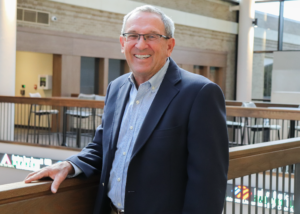 It shouldn’t surprise anyone who knows him that Bill Fowler – who will retire in June after 40 years on the COBA faculty – will be teeing up a golf ball shortly after he turns out the lights one last time in his Mabee Business Building office.
It shouldn’t surprise anyone who knows him that Bill Fowler – who will retire in June after 40 years on the COBA faculty – will be teeing up a golf ball shortly after he turns out the lights one last time in his Mabee Business Building office.
Since he joined the COBA faculty as a professor of Accounting, Fowler was always easy to find. He was either at work, at home, at church, or on the golf course. And it was likely the latter place where he could be found, more often than not.
“I imagine I’ll be out on the golf course pretty quickly,” said Fowler, who admits to a “four-ish” handicap he hopes to nudge down a little further in retirement. “Some people would say I can’t play much more than I already do, but I’ll give it a shot.”
Fowler’s love of golf is one of the first things that comes up among his colleagues when asked about his time at ACU and how difficult it will be to replace a man whose desire for every student he’s taught is to make a lifetime friend. The other is his sense of humor, which keeps his conversations, classroom, and office enveloped in laughter.
“I like to have fun,” Fowler said. “I have enjoyed harassing students and the people up and down the hallways in our building. We have a good time, which surprises some people. That’s one of the things I’ll miss. I’ll miss class because I still love being with the students. But I’ll miss hanging out in the halls and interacting with people.”
That’s because Fowler is a relationship-builder. He has kept hand-written grade books from his first 15 or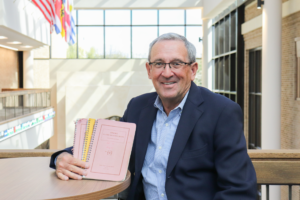 20 years on the ACU faculty and will refer to them when he’s thinking of a former student, or currently, the child of a former student. It’s his way of reconnecting to those relationships.
20 years on the ACU faculty and will refer to them when he’s thinking of a former student, or currently, the child of a former student. It’s his way of reconnecting to those relationships.
In a recruiting video posted to the COBA Facebook page in 2021, Fowler showed those grade books and said “What’s important to me about these books is not the grades, but these are my friends from years ago. As you come, we hope that you aren’t just a student but a lifetime friend.”
“That’s the whole deal right there,” Fowler said. “I’m not going to say I know or remember 100 percent of the names in those books or of the students I’ve taught, but I can see probably 90 percent of the faces of the students I’ve taught. And I know where most of them are living and working. That’s been the greatest blessing of all; just being a snippet of their walk and maybe a continued part as they go forward. That’s been the greatest part about being here.”
Dr. Brad Crisp (’93), who has served as Dean of COBA since May 2016, said the relationship part of Fowler’s personality is the most important part of what makes him an excellent instructor.
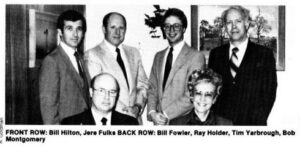
photo courtesy of the ACU Prickly Pear
“When you do something for as many years as Bill has done it, he’s got a whole host of students out there that are appreciative of him and grateful for him,” Crisp said. “I see him light up when accounting firms come back on campus, and he’s talking to each of them. And if they were a student here, he wants to talk to them and find out what’s going on in their lives and about their experience working at the firm they’re representing. He has been the example of investing in lifetime relationships with students.”
What Fowler doesn’t want, though, is a classroom full of people who don’t know how to communicate or see the bigger picture. That’s why fundamental business and communication skills are part of what he teaches.
“Earlier this semester in my graduate class, I gave an assignment one day to write a letter to a client explaining a difficult situation,” Fowler said. “Some of them asked me, ‘Write a letter? I don’t think you have to write letters anymore.’ But the point was, I wanted them to think about how to communicate an idea to someone who needs to understand the direction. The ability to explain situations is what separates people as they go forward. The people that can see the big picture and have the ability to communicate will make an impact on others.”
The impact Fowler has made on his students over the last 40 years is because they know he cares more about them as people than as future accountants.
“At the end of every year, I usually tell the students in my classes that I don’t care if they become an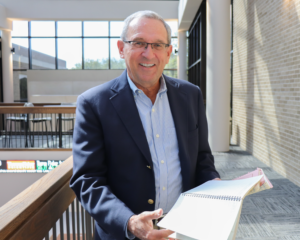 accountant or not; that’s not my job to decide what they’re going to become in life,” Fowler said. “I want them to have learned about who they are and to take whatever that is and whatever that means and use their talents to serve God and others.
accountant or not; that’s not my job to decide what they’re going to become in life,” Fowler said. “I want them to have learned about who they are and to take whatever that is and whatever that means and use their talents to serve God and others.
“If that’s becoming an accountant, that’s great,” he said. “And if they become an accountant, I want them to be the best accountant possible. I care about that, and that’s what we’ve talked about. But some of my accounting students are now funeral home directors, teachers, or stay-at-home parents, and people have no idea how smart they are as accountants. But the thing I want every student to do is to use their talent and do everything for God’s glory. And if you come back and you’re not an accountant, don’t hang your head. Just let me know what you’re doing, and how you’re serving God and others.”
Fowler’s ability to connect with his students was never more evident than during one five-minute period in one of his classes in the fall of 2014. Earlier that summer, one of his daughters suffered an Arteriovenous Malformation (AVM) rupture that required surgery and substantial rest and recovery. One day in class, Fowler updated his students on his daughter’s condition when he broke down.
“I was trying to update them on the situation, but I wasn’t doing very well,” said Fowler, who got emotional recounting the story. “I paused because I was breaking up a little bit, and this quiet student with her soft voice asked, ‘Mr. Fowler, can we pray for you?’ I was blubbering and said that would be OK, so the students gathered around me and she led the prayer, and it was awesome. If I can point to a five-minute segment out of the 40 years here at ACU, that would be near the top.”
And it’s because it confirmed everything Fowler knew to be special about ACU.
“That day told me what’s special about ACU,” he said. “I feel comfortable sharing part of my life and students feel comfortable enough to ask if they can pray for you in that moment, and then surround you and pray for you.
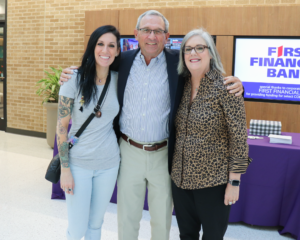 “I’m thankful to have been in this place with students who care for me and vice versa,” Fowler said. “That day there was a sense of sharing something with those kids and receiving the peace of Christ in return. I was grateful for the moment. I don’t remember the exact words, but what she said and prayed for was what we needed, and it felt comfortable and I was grateful that it provided a sense of peace. I’ll miss those moments more than anything because those moments tell you everything about what ACU is and what it means to me.”
“I’m thankful to have been in this place with students who care for me and vice versa,” Fowler said. “That day there was a sense of sharing something with those kids and receiving the peace of Christ in return. I was grateful for the moment. I don’t remember the exact words, but what she said and prayed for was what we needed, and it felt comfortable and I was grateful that it provided a sense of peace. I’ll miss those moments more than anything because those moments tell you everything about what ACU is and what it means to me.”
Those moments – the ones in the classroom, the ones he shares with students during conference time, the ones he enjoys with colleagues down the hallway or in the Mabee Business Building – made the decision to retire difficult for Fowler. But He knows it’s time for his next chapter and looks forward to writing it.
“I’ve struggled with not being part of this world anymore,” he said. “It was a hard decision, but if you’re going to make space for the next chapter of your life, you’ve got to make space. Truthfully, I don’t know what the next chapter holds for me. I will play a lot of golf, and my wife and I will travel. But I don’t even know where we’re going until we get in the car, and I’m looking forward to that part of the next chapter of my life.”
by M. C. Jennings | Apr 25, 2024 | Academics, Accounting, Alumni Spotlight, COBA Faculty, Faith Infusion, MAcc, Uncategorized
written by special contributor, Lance Fleming
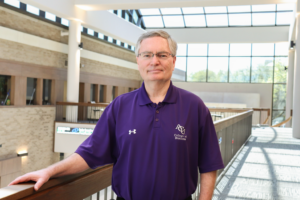 Dr. John Neill took a most circuitous route to a 40-year career teaching accounting and finance at three universities, including spending the last 24 years at ACU.
Dr. John Neill took a most circuitous route to a 40-year career teaching accounting and finance at three universities, including spending the last 24 years at ACU.
When Neill retires at the end of the 2023-24 school year, he will leave a large hole to fill in COBA. While not as gregarious as longtime colleague Bill Fowler – also retiring at the end of the school year after 40 years of service to ACU – Neill’s steady hand, wise words, and unwavering loyalty to the mission of ACU and COBA will be missed.
But had it not been for a simple twist of fate while he was a student at ACU, Neill might never have gotten into teaching, much less accounting and finance.
Neill – who lived in Abilene as a child before moving away and returning – graduated from Cooper High School in 1977. He enrolled at ACU and graduated in 1980, then worked for Pennzoil in Houston before returning to ACU to study for a master’s degree in Religious Studies.
While at ACU, he was asked to serve as an adjunct professor for an accounting class while working on his graduate degree. Surprising himself, he fell in love with the classroom. So much so that when he finished his master’s in 1984, he took off for Gainesville, Florida, where he earned his PhD in accounting from the University of Florida in 1990.
Leaving the corporate world behind and turning his focus to teaching, Neill made stops at Florida State University and Chapman University (Orange Country, California) before returning to ACU in 2000, where he finished his career.
“I never really wanted to be a preacher, but I wanted to be a minister of some sort,” Neill recalled. “Maybe it’s sort of the same mentality of teaching and preaching, but I’m not sure about that. I taught some as a doctoral student at the University of Florida, and then my first job was at Florida State University. And as I went along, I realized how much I enjoyed being in the classroom.
“After being at Florida State, I went to Chapman University, a private school without the Christian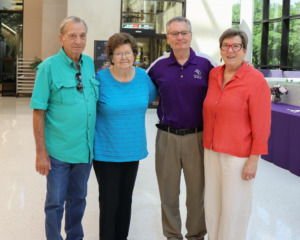 emphasis,” he said. “I liked the small, private nature of the school, but I missed the emphasis on a Christian education. When I had the opportunity to come back home and back to ACU, I found some of everything I wanted.”
emphasis,” he said. “I liked the small, private nature of the school, but I missed the emphasis on a Christian education. When I had the opportunity to come back home and back to ACU, I found some of everything I wanted.”
The relationships with students and colleagues, and the opportunity to work in an environment that matched his beliefs kept Neill at ACU when he could have gone to other universities or numerous jobs in the private sector.
“One of the main reasons I stayed at ACU is the mission,” he said. “I believe what we do and how we do it is important. The other reason is the colleagues I’ve worked with over the years. I enjoy the people I work with in our department. When I went to school at ACU and began working here, people always asked why I stayed, and I always said it was because of the people and relationships.”
He was also working for a university that has built one of the top business schools in the country and was the recipient of a game-changing $29 million gift from the Bill and Janie Dukes estate last year that will revolutionize COBA in countless ways. Before that gift, though, Neill believed the business students graduating from ACU were as good as those graduating from any other school in the country.
“I’ve had some partners in some of the top accounting firms in the country come to campus and tell me, ‘The students here (at ACU) are really good, but they don’t think they’re as good as they are,’ “ Neill said. “Sometimes our students might be intimidated because they work with a bunch of people who went to Texas or Texas A&M or SMU or wherever, but they shouldn’t feel that way because they have been well-prepared.
 “We have a good reputation of having prepared students who work hard, and we’re proud of that,” he said. “I want our students to realize that they are getting a quality education, but the most important thing is the Christian ideals they’re being taught – along with finance or accounting or whatever it might be – don’t stop when they leave here. We all want them to find a church home wherever they are, be part of the community, and have a work-life balance. Work is important, but it can’t be their entire life.”
“We have a good reputation of having prepared students who work hard, and we’re proud of that,” he said. “I want our students to realize that they are getting a quality education, but the most important thing is the Christian ideals they’re being taught – along with finance or accounting or whatever it might be – don’t stop when they leave here. We all want them to find a church home wherever they are, be part of the community, and have a work-life balance. Work is important, but it can’t be their entire life.”
Neill said he would miss the chance to talk to students and give that kind of advice, along with words of wisdom on what ACU can offer students.
“I’ve never taught freshmen; the classes I teach are traditionally a second-semester junior and a senior-level class,” Neill said. “But when I was department chair, I met with the first-year students in a new student orientation setting. One of the main things I always told him was they would get a fresh start here. A person who was the most popular in high school might not be that here. Conversely, someone with a bad reputation could start over here. Or if a student’s grades weren’t good in high school, they can turn them around here. I wanted to ensure they understood they had a fresh start here.”
It was that style that stuck out to Dr. Brad Crisp (‘93), the Dean of COBA when thinking about Neill and his impact on the students who have gone through the Mabee Business Building.
“John Neill is a genuine, personable guy with a sneaky sense of humor,” Crisp said. “He has done an excellent job for us and his students. I remember his presence, and I think the students appreciated him. He’s somebody who is one of those people at the center of living out the commitment we have for our students.”
Neill’s relationships with students and colleagues were changed in 2020 by COVID, the global pandemic that thrust millions into online education, whether they were ready for it or not. It also pushed Neill to begin thinking about his retirement, perhaps sooner than he had planned.
“Teaching during COVID was very tough,” Neill said. “When we came back, everyone was socially distanced, so it was hard to get to know students. I taught some students who never saw me without a mask, so they probably never really knew who I was. It was difficult to reach students. I taught some classes I didn’t get to know well and didn’t like that.”
That desire and ability to relate to students and colleagues has always stood out about Neill, said Dr. David Perkins, the Chairman of the Accounting Department. Perkins first met Neill when the former was a doctoral student at Texas A&M. The chairman of the Accounting Department at A&M asked him to take a prospective faculty member to dinner, mainly because he was a member of the Church of Christ, as was the prospective faculty member, who happened to be John Neill.
Perkins, the Chairman of the Accounting Department. Perkins first met Neill when the former was a doctoral student at Texas A&M. The chairman of the Accounting Department at A&M asked him to take a prospective faculty member to dinner, mainly because he was a member of the Church of Christ, as was the prospective faculty member, who happened to be John Neill.
Neill didn’t take the job at Texas A&M, but years later Perkins was hired at ACU and the two began a longtime relationship as friends and colleagues.
“Although John’s career took a different path, we eventually became colleagues teaching accounting at ACU,” Perkins said. “John is recognized as an excellent teacher, scholar, and a humble colleague and friend. He has been very gracious in helping me transition into the role of department chair when he decided to step down after leading the department for several years. John will be difficult to replace. We have been blessed to have him serve ACU, and it’s been an honor to call him a colleague and friend.”
A lifelong learner and teacher, Neill plans to do plenty of learning in the days immediately following his final day at ACU. He and his wife are taking a month-long trip to Japan, a vacation canceled in 2020 because of COVID.
“I love to travel, and you can always learn something, no matter where you go,” Neill said. “Whether you get in a car and drive for three hours or get on a plane or ship and go somewhere across the world, you can learn something about it. We’ll have the chance to experience a different culture, and I want to see what that’s like. I want to see it. To experience it. To keep growing and learning.”
by M. C. Jennings | Mar 21, 2024 | Academics, COBA Events, COBA Faculty, College Decisions, Current Students, Faith Infusion, Special Speakers, Uncategorized
written by special contributor, Lance Fleming
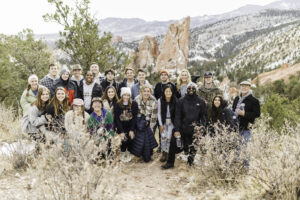 For 26 years, the ACU College of Business Administration has hosted a Leadership Summit in the mountains of Colorado intended to re-energize the mind, body, and soul. Each Summit takes on a life of its own, providing answers to the questions the attendees bring with them each year.
For 26 years, the ACU College of Business Administration has hosted a Leadership Summit in the mountains of Colorado intended to re-energize the mind, body, and soul. Each Summit takes on a life of its own, providing answers to the questions the attendees bring with them each year.
The recently completed 2024 version of Leadership Summit wasn’t different. This year’s version might have been the most diverse session of any of the 26 that have occurred.
Established in 1998 in the College of Business Administration, Summit is a one-week, 3-hour course hosted in picturesque Colorado. The course blends academic rigor with an environment ripe for deep, personal, and lasting encounters with Jesus. Dr. Rick Lytle, Tim Johnston (‘80), and Mike Winegeart (’86) dreamed of an experience that would take students out of the regular classroom and inspire them to think of their future work as missional. The first Leadership Summit was held in 1998, and the trio would go on to be involved in various aspects of the class over the next few decades.
Leadership Summit is open to all majors and classifications on campus – it’s not just for business students. Because this year’s cohort consisted of so many non-business majors, Dr. Dennis Marquardt, Associate Professor of Management and Director of the Lytle Center for Faith and Leadership, said Summit 2024 started a bit differently than other sessions.
“This was one of our most diverse groups along the lines of classification and major, so the first few days of Summit were really about getting to know each other,” he said. “It takes time to trust one another and be vulnerable with each other, which is an important aspect of the growth process at Summit. We also hosted more speakers than ever and from a wide range of industry backgrounds, so the week was packed, especially the first two days. By Wednesday, I noticed the group came together and opened up around some deep spiritual topics.”
The base curriculum for this year’s Summit centered around two books: Christian Reflections on the Leadership Challenge by Jim Kouzes and Barry Posner and The Freedom of Self-forgetfulness by Tim Keller. Each day is assigned one of the five leadership practices from the Leadership Challenge – Model the Way, Inspire a Shared Vision, Challenge the Process, Enable Others to Act, and Encourage the Heart – but every speaker is encouraged to share their spiritual journey in whatever way the Spirit moves.
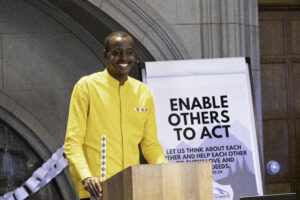
Serge Gasore (’09), co-founder of Rwanda Children
This year, Marquardt said, notable themes emerged across topics such as forgiveness from Serge Gasore (’09) and Tonya Carruthers, pride and humility from Tim Goeglein and Tony Roach (’01), and vision and role-modeling from Elise Mitchell (’83) and April Anthony (’89). Each speaker, he said, is encouraged to be transparent and vulnerable, creating an environment for deep collective reflection and sharing with the students. When that happens, Jesus takes over, and theory and books fade into the background.
“It’s one thing to learn about theory and read textbooks on leadership, and there certainly is a place for that,” Marquardt said, “but true learning and growth happens in community and relationships. Summit is distinct because it pairs the best leadership teaching with the spirit and heart. The environment is ripe for true reflection on how we become the servants God calls us to be so that we might be people of influence known for bearing hope, peace, and love.”
Hayden Poorman – a senior from Tuscola graduating in May and triple-majoring in finance, accounting, and information systems – completed his second trip to Summit in January. Like last year, Poorman said he left Colorado Springs with a definite direction for his life.
“Last year, I felt incredibly empowered to make changes in my life and impact those around me,” Poorman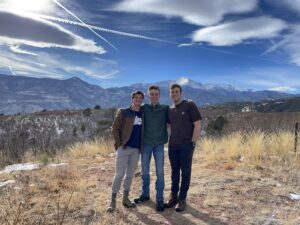 said. “For instance, after coming down from the mountain, my friend Matthew Trow (’24) and I initiated a Real Estate & Banking club on campus to assist students in navigating the industry. This year, I went to Summit seeking Godly wisdom and guidance and a time to wrestle with my inner struggles.
said. “For instance, after coming down from the mountain, my friend Matthew Trow (’24) and I initiated a Real Estate & Banking club on campus to assist students in navigating the industry. This year, I went to Summit seeking Godly wisdom and guidance and a time to wrestle with my inner struggles.
“Instead of feeling energized and engaging in constant hiking and exploration (though I did still hike), I found solitude in the mountain landscape and sought God,” he said. “ I firmly believe that God worked on me in the stillness of the mountains. I left the mountain prepared to confront my final semester of college and effectively navigate the valley I was traversing.”
Poorman said one reason he felt ready to take on the final weeks of his collegiate experience was the nightly conversation with his roommate on the trip, Mason Graham (’25).
“We discussed the day’s topics and delved into how life was unfolding for each of us, offering support and encouragement,” Poorman said. “Mason played a pivotal role in helping me articulate my thoughts and was instrumental in navigating my journey through faith and suffering.”
Allie Harper, a junior Bible and ministry major from Carrollton, was deeply affected by the connections with students and speakers during the six days spent on the mountain.
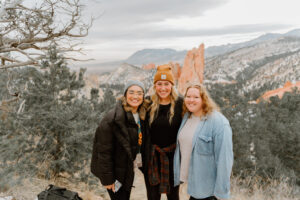 “I think what makes Summit so impactful for people is that you get to retreat from everyday routine and spend time with like-minded people,” Harper said. “The connections and friendships I made at Summit are special because of our unity in Christ. Those connections have given me people to rely on, whether needing strong leaders to help with a ministry event or business and finance advice.
“I think what makes Summit so impactful for people is that you get to retreat from everyday routine and spend time with like-minded people,” Harper said. “The connections and friendships I made at Summit are special because of our unity in Christ. Those connections have given me people to rely on, whether needing strong leaders to help with a ministry event or business and finance advice.
“Something I remembered during one of the morning sessions was the people in my life I love who don’t know Christ,” she said. “Needless to say, I was a teary mess but also felt loved and encouraged by those who sat with me and prayed for those people. It reminded me that sometimes we have to sit in grief, but the Lord always brings hope and joy.”
This year’s Summit was Harper’s first venture to the mountain castle, and she said she came away with a deeper appreciation of the skills needed to be effective in ministry.
“I wasn’t sure what exactly to expect at Summit, but the whole week, I was surprised by the connections to faith, scripture, and community,” she said. “I saw what good Christian leadership looks like through the speakers, professors, and fellow students. It reminded me of the importance of leadership skills and not just a knowledge of scripture. I realized that to be effective as a minister, I need both. I would encourage those who aren’t pursuing a career in ministry but in the business world that God has called and equipped them because the world needs more Christ-like teachers, financial advisors, doctors, and salespeople. I left the week grateful because I had been equipped with scripture and the leadership skills to make me a better minister.”
And those moments – of reflection, self-awareness, and enlightenment – help make the moving parts that go into planning a week-long, out-of-state conference worth it for Marquardt.
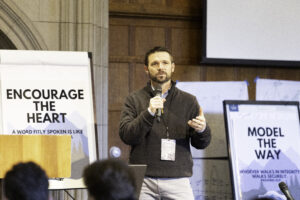
Dr. Dennis Marquardt
“There was just a moment this year when the Summit program began, and I looked at all of us worshipping together and about to embark on this special experience for the next week, and it broke me,” Marquardt said. “God is good. And He is gracious to allow us such a transformational experience.”
And that experience is what the first 26 Leadership Summits have given each participant and will continue to be the focus of in the future.
“God does amazing things, and He chooses to do those things through His people,” Marquardt said. “When we surrender to Him, our lives become this grand Kingdom adventure (which is not always safe or easy), but it allows us to serve others in transformational ways. That service might be as a business leader, community member, or in a family, but we will all have the opportunity to step into it. We want Leadership Summit to create leaders who are servants first and run into the storms and fires of life to be bearers of hope, peace, and life.”
 Senior marketing major Carol Queiroz from Brazil recently completed a rewarding internship at Imaginuity, a marketing agency based in Dallas. Her experiences during this internship have not only enhanced her skill set but also prepared her for future career opportunities.
Senior marketing major Carol Queiroz from Brazil recently completed a rewarding internship at Imaginuity, a marketing agency based in Dallas. Her experiences during this internship have not only enhanced her skill set but also prepared her for future career opportunities. Carol credits her time at ACU as essential preparation for her internship and future endeavors. The Professional Development team, in particular, has been instrumental in her journey, providing support and resources throughout her college years.
Carol credits her time at ACU as essential preparation for her internship and future endeavors. The Professional Development team, in particular, has been instrumental in her journey, providing support and resources throughout her college years. At the outset of her internship, Katelynn participated in a comprehensive training program alongside other audit interns from the region. This training provided her with foundational knowledge and set the stage for her subsequent hands-on experience. One highlight of her internship was the Intern Innovation Experience, where she explored data visualization and analysis tools crucial to the accounting profession. This exposure to cutting-edge technologies broadened her perspective on the role of data in auditing.
At the outset of her internship, Katelynn participated in a comprehensive training program alongside other audit interns from the region. This training provided her with foundational knowledge and set the stage for her subsequent hands-on experience. One highlight of her internship was the Intern Innovation Experience, where she explored data visualization and analysis tools crucial to the accounting profession. This exposure to cutting-edge technologies broadened her perspective on the role of data in auditing. As Katelynn embarks on her professional journey, her experiences at EY and the foundation laid at ACU will undoubtedly propel her toward success in the accounting field. Her story is an inspiring reminder of the impact of internships and the importance of seizing opportunities in one’s academic and professional journey.
As Katelynn embarks on her professional journey, her experiences at EY and the foundation laid at ACU will undoubtedly propel her toward success in the accounting field. Her story is an inspiring reminder of the impact of internships and the importance of seizing opportunities in one’s academic and professional journey.
 friends of the university. Relationships with family. It’s who he is, and it’s been his lighthouse during his eight-year tenure as Dean.
friends of the university. Relationships with family. It’s who he is, and it’s been his lighthouse during his eight-year tenure as Dean.  The list of accomplishments during his tenure is long and has COBA positioned to continue its rise when the new Dean steps in later this year. During his eight years, Crisp has hired more than one dozen new faculty members plus key administrative staff, overseen a complete renovation of the Mabee Business Building, moved COBA into the world of online education, successfully integrated technology into the core curriculum, and led the charge to require internships. He has overseen successful accreditation processes for the Accreditation Board for Engineering and Technology (ABET) and the
The list of accomplishments during his tenure is long and has COBA positioned to continue its rise when the new Dean steps in later this year. During his eight years, Crisp has hired more than one dozen new faculty members plus key administrative staff, overseen a complete renovation of the Mabee Business Building, moved COBA into the world of online education, successfully integrated technology into the core curriculum, and led the charge to require internships. He has overseen successful accreditation processes for the Accreditation Board for Engineering and Technology (ABET) and the  of people who’ve done this and shown the way and built a foundation for what you’re doing,” Crisp said. “I’m fortunate to have important, ongoing relationships with those men. I also have relationships with so many peers, donors, and other people who love this place and want to figure out how to help the current students in what they want to accomplish.”
of people who’ve done this and shown the way and built a foundation for what you’re doing,” Crisp said. “I’m fortunate to have important, ongoing relationships with those men. I also have relationships with so many peers, donors, and other people who love this place and want to figure out how to help the current students in what they want to accomplish.” Crisp said he plans to use his sabbatical to recharge his batteries, re-tool for research and teaching, travel with his wife Jennifer (’93), visit family, and await the arrival of a second grandchild. He’ll return to the classroom at ACU in the fall of 2025, where he will again engage with students daily, helping lead them in the direction that best fits their skills.
Crisp said he plans to use his sabbatical to recharge his batteries, re-tool for research and teaching, travel with his wife Jennifer (’93), visit family, and await the arrival of a second grandchild. He’ll return to the classroom at ACU in the fall of 2025, where he will again engage with students daily, helping lead them in the direction that best fits their skills. It shouldn’t surprise anyone who knows him that Bill Fowler – who will retire in June after 40 years on the COBA faculty – will be teeing up a golf ball shortly after he turns out the lights one last time in his Mabee Business Building office.
It shouldn’t surprise anyone who knows him that Bill Fowler – who will retire in June after 40 years on the COBA faculty – will be teeing up a golf ball shortly after he turns out the lights one last time in his Mabee Business Building office. 20 years on the ACU faculty and will refer to them when he’s thinking of a former student, or currently, the child of a former student. It’s his way of reconnecting to those relationships.
20 years on the ACU faculty and will refer to them when he’s thinking of a former student, or currently, the child of a former student. It’s his way of reconnecting to those relationships.
 accountant or not; that’s not my job to decide what they’re going to become in life,” Fowler said. “I want them to have learned about who they are and to take whatever that is and whatever that means and use their talents to serve God and others.
accountant or not; that’s not my job to decide what they’re going to become in life,” Fowler said. “I want them to have learned about who they are and to take whatever that is and whatever that means and use their talents to serve God and others. “I’m thankful to have been in this place with students who care for me and vice versa,” Fowler said. “That day there was a sense of sharing something with those kids and receiving the peace of Christ in return. I was grateful for the moment. I don’t remember the exact words, but what she said and prayed for was what we needed, and it felt comfortable and I was grateful that it provided a sense of peace. I’ll miss those moments more than anything because those moments tell you everything about what ACU is and what it means to me.”
“I’m thankful to have been in this place with students who care for me and vice versa,” Fowler said. “That day there was a sense of sharing something with those kids and receiving the peace of Christ in return. I was grateful for the moment. I don’t remember the exact words, but what she said and prayed for was what we needed, and it felt comfortable and I was grateful that it provided a sense of peace. I’ll miss those moments more than anything because those moments tell you everything about what ACU is and what it means to me.” Dr. John Neill took a most circuitous route to a 40-year career teaching accounting and finance at three universities, including spending the last 24 years at ACU.
Dr. John Neill took a most circuitous route to a 40-year career teaching accounting and finance at three universities, including spending the last 24 years at ACU. emphasis,” he said. “I liked the small, private nature of the school, but I missed the emphasis on a Christian education. When I had the opportunity to come back home and back to ACU, I found some of everything I wanted.”
emphasis,” he said. “I liked the small, private nature of the school, but I missed the emphasis on a Christian education. When I had the opportunity to come back home and back to ACU, I found some of everything I wanted.” “We have a good reputation of having prepared students who work hard, and we’re proud of that,” he said. “I want our students to realize that they are getting a quality education, but the most important thing is the Christian ideals they’re being taught – along with finance or accounting or whatever it might be – don’t stop when they leave here. We all want them to find a church home wherever they are, be part of the community, and have a work-life balance. Work is important, but it can’t be their entire life.”
“We have a good reputation of having prepared students who work hard, and we’re proud of that,” he said. “I want our students to realize that they are getting a quality education, but the most important thing is the Christian ideals they’re being taught – along with finance or accounting or whatever it might be – don’t stop when they leave here. We all want them to find a church home wherever they are, be part of the community, and have a work-life balance. Work is important, but it can’t be their entire life.” Perkins, the Chairman of the Accounting Department. Perkins first met Neill when the former was a doctoral student at Texas A&M. The chairman of the Accounting Department at A&M asked him to take a prospective faculty member to dinner, mainly because he was a member of the Church of Christ, as was the prospective faculty member, who happened to be John Neill.
Perkins, the Chairman of the Accounting Department. Perkins first met Neill when the former was a doctoral student at Texas A&M. The chairman of the Accounting Department at A&M asked him to take a prospective faculty member to dinner, mainly because he was a member of the Church of Christ, as was the prospective faculty member, who happened to be John Neill. For 26 years, the ACU College of Business Administration has hosted a Leadership Summit in the mountains of Colorado intended to re-energize the mind, body, and soul. Each Summit takes on a life of its own, providing answers to the questions the attendees bring with them each year.
For 26 years, the ACU College of Business Administration has hosted a Leadership Summit in the mountains of Colorado intended to re-energize the mind, body, and soul. Each Summit takes on a life of its own, providing answers to the questions the attendees bring with them each year.
 said. “For instance, after coming down from the mountain, my friend Matthew Trow (’24) and I initiated a Real Estate & Banking club on campus to assist students in navigating the industry. This year, I went to Summit seeking Godly wisdom and guidance and a time to wrestle with my inner struggles.
said. “For instance, after coming down from the mountain, my friend Matthew Trow (’24) and I initiated a Real Estate & Banking club on campus to assist students in navigating the industry. This year, I went to Summit seeking Godly wisdom and guidance and a time to wrestle with my inner struggles. “I think what makes Summit so impactful for people is that you get to retreat from everyday routine and spend time with like-minded people,” Harper said. “The connections and friendships I made at Summit are special because of our unity in Christ. Those connections have given me people to rely on, whether needing strong leaders to help with a ministry event or business and finance advice.
“I think what makes Summit so impactful for people is that you get to retreat from everyday routine and spend time with like-minded people,” Harper said. “The connections and friendships I made at Summit are special because of our unity in Christ. Those connections have given me people to rely on, whether needing strong leaders to help with a ministry event or business and finance advice. 